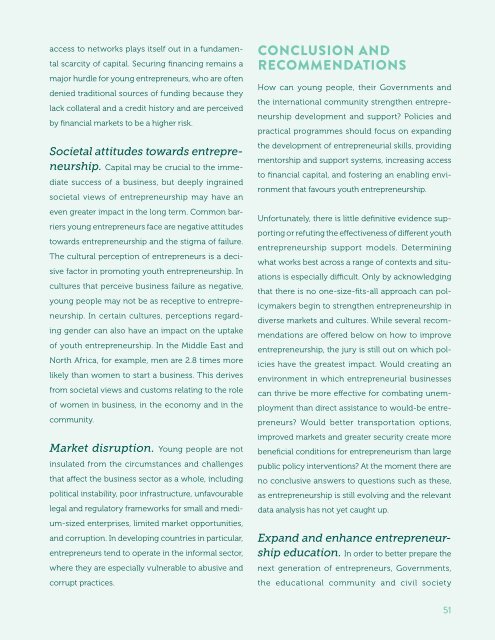YOUTH CIVIC
JieguI2U
JieguI2U
You also want an ePaper? Increase the reach of your titles
YUMPU automatically turns print PDFs into web optimized ePapers that Google loves.
access to networks plays itself out in a fundamental<br />
scarcity of capital. Securing financing remains a<br />
major hurdle for young entrepreneurs, who are often<br />
denied traditional sources of funding because they<br />
lack collateral and a credit history and are perceived<br />
by financial markets to be a higher risk.<br />
Societal attitudes towards entrepreneurship.<br />
Capital may be crucial to the immediate<br />
success of a business, but deeply ingrained<br />
societal views of entrepreneurship may have an<br />
even greater impact in the long term. Common barriers<br />
young entrepreneurs face are negative attitudes<br />
towards entrepreneurship and the stigma of failure.<br />
The cultural perception of entrepreneurs is a decisive<br />
factor in promoting youth entrepreneurship. In<br />
cultures that perceive business failure as negative,<br />
young people may not be as receptive to entrepreneurship.<br />
In certain cultures, perceptions regarding<br />
gender can also have an impact on the uptake<br />
of youth entrepreneurship. In the Middle East and<br />
North Africa, for example, men are 2.8 times more<br />
likely than women to start a business. This derives<br />
from societal views and customs relating to the role<br />
of women in business, in the economy and in the<br />
community.<br />
Market disruption. Young people are not<br />
insulated from the circumstances and challenges<br />
that affect the business sector as a whole, including<br />
political instability, poor infrastructure, unfavourable<br />
legal and regulatory frameworks for small and medium-sized<br />
enterprises, limited market opportunities,<br />
and corruption. In developing countries in particular,<br />
entrepreneurs tend to operate in the informal sector,<br />
where they are especially vulnerable to abusive and<br />
corrupt practices.<br />
CONCLUSION AND<br />
RECOMMENDATIONS<br />
How can young people, their Governments and<br />
the international community strengthen entrepreneurship<br />
development and support? Policies and<br />
practical programmes should focus on expanding<br />
the development of entrepreneurial skills, providing<br />
mentorship and support systems, increasing access<br />
to financial capital, and fostering an enabling environment<br />
that favours youth entrepreneurship.<br />
Unfortunately, there is little definitive evidence supporting<br />
or refuting the effectiveness of different youth<br />
entrepreneurship support models. Determining<br />
what works best across a range of contexts and situations<br />
is especially difficult. Only by acknowledging<br />
that there is no one-size-fits-all approach can policymakers<br />
begin to strengthen entrepreneurship in<br />
diverse markets and cultures. While several recommendations<br />
are offered below on how to improve<br />
entrepreneurship, the jury is still out on which policies<br />
have the greatest impact. Would creating an<br />
environment in which entrepreneurial businesses<br />
can thrive be more effective for combating unemployment<br />
than direct assistance to would-be entrepreneurs?<br />
Would better transportation options,<br />
improved markets and greater security create more<br />
beneficial conditions for entrepreneurism than large<br />
public policy interventions? At the moment there are<br />
no conclusive answers to questions such as these,<br />
as entrepreneurship is still evolving and the relevant<br />
data analysis has not yet caught up.<br />
Expand and enhance entrepreneurship<br />
education. In order to better prepare the<br />
next generation of entrepreneurs, Governments,<br />
the educational community and civil society<br />
51


